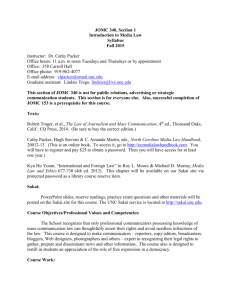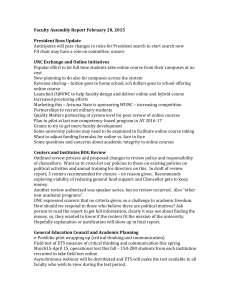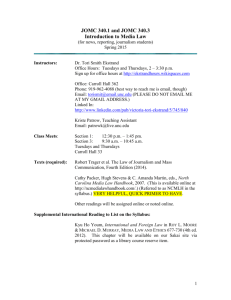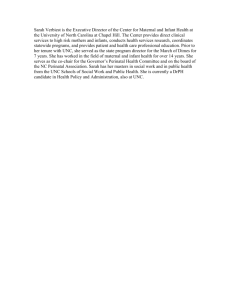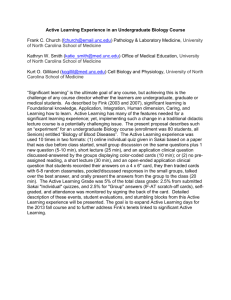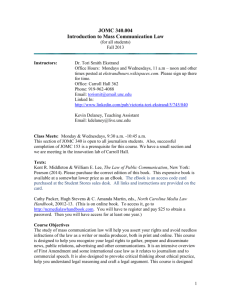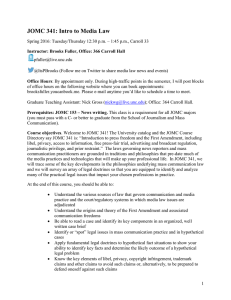740.1: Media Law
advertisement
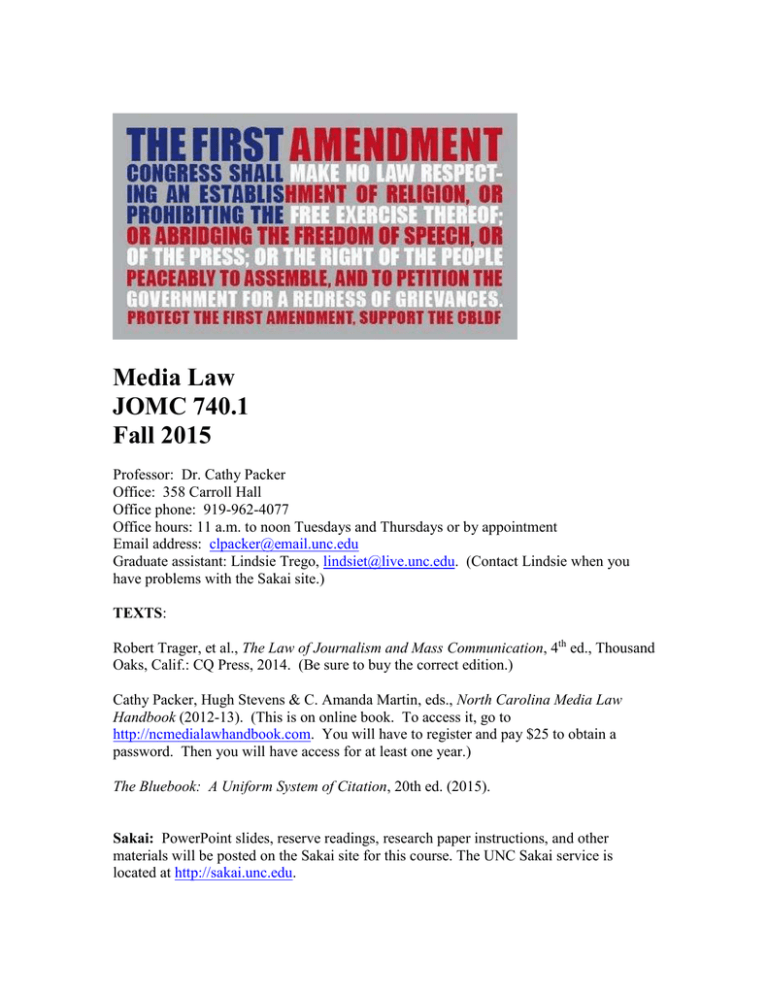
Media Law JOMC 740.1 Fall 2015 Professor: Dr. Cathy Packer Office: 358 Carroll Hall Office phone: 919-962-4077 Office hours: 11 a.m. to noon Tuesdays and Thursdays or by appointment Email address: clpacker@email.unc.edu Graduate assistant: Lindsie Trego, lindsiet@live.unc.edu. (Contact Lindsie when you have problems with the Sakai site.) TEXTS: Robert Trager, et al., The Law of Journalism and Mass Communication, 4th ed., Thousand Oaks, Calif.: CQ Press, 2014. (Be sure to buy the correct edition.) Cathy Packer, Hugh Stevens & C. Amanda Martin, eds., North Carolina Media Law Handbook (2012-13). (This is on online book. To access it, go to http://ncmedialawhandbook.com. You will have to register and pay $25 to obtain a password. Then you will have access for at least one year.) The Bluebook: A Uniform System of Citation, 20th ed. (2015). Sakai: PowerPoint slides, reserve readings, research paper instructions, and other materials will be posted on the Sakai site for this course. The UNC Sakai service is located at http://sakai.unc.edu. READ YOUR EMAIL, PLEASE! Your professor will send you schedule changes, news stories, and other important information almost daily. Don’t miss it. COURSE OBJECTIVES: JOMC 740 is a graduate course in which students explore the delicate balance that exists between freedom and control of the media. You will study both old and new law because both are relevant today. You also will study both theoretical aspects of the law and how the law applies to professional work. Knowing the theory will enhance your understanding of the law and enable you to participate in the on-going national debate over how the media should – or should not – be regulated. Because the courts, especially the U.S. Supreme Court, are ultimately responsible for interpreting the First Amendment and maintaining the balance between freedom and control, your study will focus on judicial decisions and reasoning. The bulk of the readings and class discussions will be aimed at analyzing and understanding court opinions affecting the media. It is important to recognize, however, that other very significant sources of press privileges and controls exist. Therefore, you also will study statutory law and executive and administrative actions. The objectives of the course are to 1) familiarize students with the U.S. system of freedom of expression, including its historical and philosophical bases; 2) provide students with a knowledge and understanding of media law so that as professional communicators they can thoughtfully assert their rights and avoid needless infractions of the law; 3) teach students to read critically and to analyze and synthesize what they read; 4) develop an understanding of the judicial system and process; 5) introduce students to legal research skills; and 6) prepare students to become teachers of media and journalism. READING AND CLASS PARTICIPATION: JOMC 740 is part seminar, part lecture class. That means each student is a seminar participant, expected to contribute to the discussion and play a significant role in conducting the class. Some days it will be necessary for your professor to lecture. Other times classes will be discussions in which all students will be expected to share their knowledge, opinions, and questions. Regardless of the format of a particular class, it is absolutely essential that all students come to every class and come prepared. That means all reading assignments on the class schedule must be completed before the class period during which we will discuss a particular topic. As you do the reading, take notes, brief major cases, and write down your ideas and questions for discussion in class. You are expected to attend every class meeting, to be on time, and not to leave before the class is over. Please turn off your cell phones and put them away where you and your professor cannot see them. Most days you will be allowed to use your computer in class, but you will lose that privilege if you’re caught shopping for shoes or using Facebook instead of taking notes. Also, no napping will be tolerated. Be aware that while attendance figures into your class participation grade, if all you do is show up for class, your class participation grade will be an F. You must contribute to class discussion in meaningful ways is order to earn a higher class participation grade. SPECIAL EVENTS: Students are required to attend at least one but perhaps two media law events outside of class. This is one: This year’s First Amendment Day keynote lecture will be at 7 p.m. on Tuesday, Sept. 29 in Carroll 111. The speaker will be Danielle Keats Citron, author of Hate Crimes in Cyberspace. Citron is the Lois K. Macht Research Professor & Professor of Law at the University of Maryland Francis King Carey School of Law. Information about the keynote address and all the day’s events will be available here: http://firstamendmentday.unc.edu. If you are unable to attend this or any other assigned special event, talk to Dr. Packer. She will assign another lecture for you to attend. Failure to attend either the assigned event or a substitute event will negatively affect a student’s class participation grade. MEDIA LAW NEWS PRESENTATIONS: Each student is required to make one 10minute, in-class presentation of a media law story in the news. These presentations will be given throughout the semester, usually once a week. Detailed instructions will be posted on the class Sakai site. PROBLEM SOLVING EXERCISES: Because knowing the law is of little value if you don’t know how to use the law, you will be assigned three take-home problem-solving exercises during the semester. There will be a copyright problem, a libel problem, and a public records problem. Detailed instructions will be provided when the problems are assigned. RESEARCH PAPERS: This is a part of the course that is guaranteed to make your brain grow. Each student will be required to identify a research topic in the field of media law, to read what other scholars already have written on that topic, to develop of set of research questions related to the topic, and then to read and analyze primary legal materials (e.g., court decisions, congressional hearings, or statutes) to answer the research questions. This will result in a 20-page paper, including footnotes. You will be doing what scholars do – creating new knowledge. To help ensure your success, you will work on the paper in four stages, and you will receive feedback from your professor at each stage. First you’ll hand in your topic idea. Once your professor has approved and commented on your topic, you’ll research and write the introduction and literature review. Next you’ll submit research questions and a methodology section. Then, having received feedback on the entire first half of the paper, you’ll complete the paper. Detailed instructions will be posted on the class Sakai site. EXAMS: There will be no exams. GRADES: Final grades will be determined as follows: Problem-solving exercises ----------------------Media law news presentation -------------------Class participation -----------------------------Paper topic memo ------------------------------Paper introduction and literature review ---- 30% (10% each) 10% 10% 5% 10% Paper research questions and methodology -- 5% Final research paper ----------------------------- 30% 100% *** No late written assignments will be accepted. (That means you will receive a zero on any written assignment handed in after the deadline.) AEJMC SOUTHEAST COLLOQUIUM: Ph.D. students are required to submit their papers to the paper competition for the 2016 AEJMC Southeast Colloquium, and master’s students are encouraged to submit their papers. The submission deadline is Dec. 7, 2015. The colloquium is March 3-5 in Baton Rouge, La., the home of Louisiana State University and great Cajun food. You will hear a great deal more about this. Meanwhile, check this out: http://melresearch.com/aejmc/. A word about the UNC graduate school grading system: It is different from the traditional A/B/C/D +/‐ system by which most of us were measured as undergraduates. You can read about graduate school grades in the UNC Graduate School handbook (available in full as a .pdf document at http://gradschool.unc.edu/handbook/pdf/handbook.pdf). Here is a description of how grades can be earned in this course: H (clear excellence and superiority): The grade of H is earned by students who clearly, convincingly, and constantly demonstrate a superior ability to critically analyze, synthesize, and apply assigned readings to class discussions and exams; and who produce legal-research papers that demonstrate a superior ability to formulate and conduct an original legalresearch project that utilizes a variety of highly relevant and appropriate secondary and primary legal sources, contributes substantial and original knowledge to the field, and is impeccably documented and footnoted using The Bluebook: A Uniform System of Citation. P (entirely satisfactory): The grade of P is earned by students who consistently demonstrate a clear and substantial ability to critically analyze, synthesize, and apply assigned readings to class discussions and exams; and who produce legal-research papers that demonstrate a clear and substantial ability to formulate and conduct an original legal-research project that utilizes sufficient, relevant. and appropriate secondary and primary legal sources, contributes original knowledge to the field, and is well documented and footnoted using The Bluebook: A Uniform System of Citation. L (low pass): The grade of L is earned by students who demonstrate substantial achievement of most but not all of the requirements necessary for the grade of P. Any student who receives an L in JOMC 740 must pass a comprehensive media law exam given the following semester or retake the course. F (failure): The grade of F is earned by students who occasionally do not participate in class discussions, fail exams, or fail to meet the minimum requirements for multiple components of the legal-research project. A student who receives an F is not allowed to continue in the graduate program. Here’s another way to think about the graduate grading system. For graduate-level media law classes in the UNC School of Media and Journalism, we (the faculty who teach those classes) generally think that an H represents an A, a P represents a B or a C, and an L represents a D. However, please be aware there is no grade inflation in media law! Most UNC graduate students earn Ps in most of their classes. An H represents exceptional work. ACCREDITATION: The School of Media and Journalism’s accrediting body outlines a number of values you should be aware of and competencies you should be able to demonstrate by the time you graduate from our program. Learn more about them here: http://www2.ku.edu/~acejmc/PROGRAM/PRINCIPLES.SHTML#vals&comps. No single course could possibly give you all of these values and competencies; but collectively, our classes are designed to build your abilities in each of these areas. Among the Professional Values and Competencies for accreditation that will be addressed in this course is understanding and applying the principles and laws of freedom of speech and press in the United States, as well as having an understanding of the range of systems of freedom of expression around the world, including the right to dissent, to monitor and criticize power, and to assemble and petition for redress of grievances. Our focus in this course will be American law, but the course will include selected international and foreign media law principles and the extent and role of free speech and press in other countries. HONOR CODE: The Honor Code and the Campus Code, embodying the ideals of academic honesty, integrity and responsible citizenship, have for over 100 years governed the performance of all academic work and student conduct at the University. Acceptance by a student of enrollment in the University presupposes a commitment to the principles embodied in these codes and a respect for this most significant University tradition. Your participation in this course comes with the expectation that your work will be completed in full observance of the Honor Code. Academic dishonesty in any form is unacceptable, because any breach in academic integrity, however small, strikes destructively at the University's life and work. The Instrument of Student Judicial Governance, which contains the provisions of the Honor Code, states that students have four general responsibilities under the Code: 1. Obey and support the enforcement of the Honor Code; 2. Refrain from lying, cheating, or stealing; 3. Conduct themselves so as not to impair significantly the welfare or the educational opportunities of others in the University community; and 4. Refrain from conduct that impairs or may impair the capacity of University and associated personnel to perform their duties, manage resources, protect the safety and welfare of members of the University community, and maintain the integrity of the University. The Instrument defines plagiarism as "deliberate or reckless representation of another's words, thoughts, or ideas as one's own without attribution in connection with submission of academic work, whether graded or otherwise." Please submit all written work with the following pledge: “On my honor, I have neither given nor received unauthorized aid on this assignment.” STUDENTS NEEDING ACADEMIC ACCOMMODATIONS: Students who may need academic accommodations and associated resources, like extended testing time, must contact the Department of Accessibility Resources and Service (DARS) in a timely manner to determine whether and to what to extent such accommodations or resources are necessary for this course. Only DARS can make this determination for you – not your professor. It is the goal of UNC to “ensure that all programs and facilities of the University are accessible to all members of the University community.” If you think this might apply to you, please contact DARS as soon as possible either by telephone at 9628300 or through the DARS website at http://accessibility.unc.edu/about-us for additional information. Please know that I am fully committed to this policy and will abide by any recommendations DARS makes for you for this course. DIVERSITY AND INCLUSIVITY: The University is committed to fostering a diverse and inclusive academic community, and prohibiting discrimination and harassment. Please review the University policy statements on diversity and inclusivity, and prohibited harassment and discrimination, both in The Undergraduate Bulletin 20142015 at http://www.unc.edu/ugradbulletin/. Please know that I am fully committed to fostering and enforcing these policies. Media Law Assignment Schedule JOMC 740.1 Fall 2015 Note: All readings should be completed before class. If you are uncertain what you should be reading for a particular class, just ask your professor. Additional readings might be assigned later. Readings designated as Trager are from The Law of Journalism and Mass Communication. Readings designated as NC are from the North Carolina Media Law Handbook. Week 1, Aug. 18 and 20 Introduction to the course, student research ideas/interests, how the law is made, how the courts work Read: Chapter 1 in Trager View: This video about the U.S. Supreme Court: http://www.cspanvideo.org/program/HometoA In-class research lesson: How to locate and brief a court opinion. Introduce Westlaw and sign up for passwords √ this out for a description of the N.C. courts: http://www.nccourts.org/ (click on the names of the various courts under “Favorites”) Week 2, Aug. 25 and 27 First Amendment Read: Chapter 2 in Trager In-class research lesson: How to identify a research paper topic and prepare your research topic memo Week 3, Sept. 1 and 3 First Amendment (cont.) Read: Chapter 3 in Trager; Brown v. The Town of Cary, 706 F.3d 294 (4th Cir. 2013). Week 4, Sept. 8 and 10 Intellectual property law Read: Chapter 13 in Trager Paper topic memo due at start of class Tuesday √ this out: U.S. Copyright Office website at http://www.copyright.gov. This tells you how to register your own copyrights. Week 5, Sept. 15 and 17 Intellectual property law (cont.) Read: Campbell v. Acuff-Rose Music, 510 U.S. 569 (1994); compare the music at issue in the Campbell case by listening to Roy Orbison’s “Oh, Pretty Woman” and The 2 Live Crew’s “Pretty Woman” on YouTube or elsewhere. Law librarian Tim Gallina in class Tuesday for a Westlaw lesson Week 6, Sept. 22 and 24 Intellectual property law (cont.) In-class research lesson: Discuss how to write the introduction and literature review for your research paper. Week 7, Sept. 29 and Oct. 1 (No class on Sept. 29. Attend 7 p.m. First Amendment Day keynote lecture in Carroll 111.) Newsgathering and access to information Read: The chapter on access to government meetings and the chapter on access to government records in NC. There is no need to read the long, alphabetized list of types of records in the records chapter. Just be aware such a list exists. Problem-solving exercise #1 (copyright) due by noon Tuesday via email to clpacker@email.unc.edu. Raleigh Attorney Amanda Martin in class Thursday Week 8, Oct. 6 and 8 Newsgathering and access to information (cont.) Read: Chapter 8 in Trager Introduction and literature review due at start of class Tuesday Week 9, Oct. 13 and 15 (Fall break! No class on Oct. 15) Newsgathering and access to information (cont.) Read: Chapter 10 in Trager; Richmond Newspapers v. Virginia, 448 U.S. 555 (1980). Week 10, Oct. 20 and 22 Libel Read: Chapter 4 in Trager Problem-solving exercise #2 (public records request) due at start of class Tuesday Week 11, Oct. 27 and 29 Libel (cont.) Read: Chapter 5 in Trager; libel chapter in NC (a very readable account of libel law that includes the N.C. legal rules) Research questions and methodology due at start of class Tuesday In-class research lesson: how to write the body and the conclusion of your paper √ this out: The N.C. Department of Correction’s policy on who can witness executions at http://www.doc.state.nc.us/dop/deathpenalty/witness.htm Week 12, Nov. 3 and 5 Libel (cont.) Read: New York Times v. Sullivan, 376 U.S. 254 (1964) Week 13, Nov. 10 and 12 Privacy Read: Chapter 6 in Trager Problem-solving exercise #3 (libel) due at start of class Tuesday Week 14, Nov. 17 and 19 Catching up Week 15, Nov. 24 and 26 (Thanksgiving! No class on Nov. 26) Final papers due at start of class Tuesday. Please hand in a paper copy. Week 16, Dec. 1 (Tuesday is the last day of class.) Catching up and looking forward Final Examination No final exam. Happy holidays!
